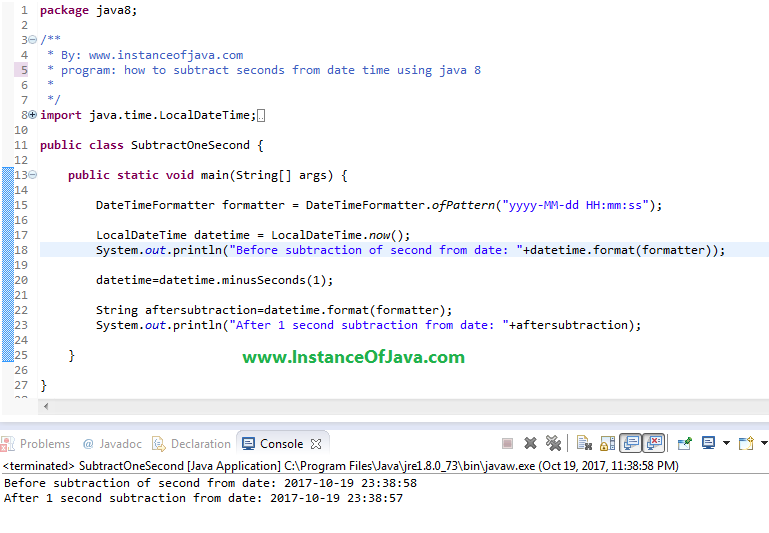
- #Instant minus minutes java example how to
- #Instant minus minutes java example code
- #Instant minus minutes java example plus
LocalDateTime.ofInstant(Instant.ofEpochMilli(file.lastModified()), ZoneId.systemDefault())) ("File's last modified in LocalDateTime: " + ("File's last modified in millisecond: " + file.lastModified()) Return Value an Instant based on this instant with the specified amount subtracted, not null. public Instant minus (TemporalAmount amountToSubtract) Parameters amountToSubtract the amount to subtract, not null. ("Update file's last modified successfully.") Following is the declaration for (TemporalAmount amountToSubtract) method. ("File's last modified in LocalDateTime: " + localDateTime) īoolean isModified = tLastModified(timestamp) LocalDateTime localDateTime = LocalDateTime.ofInstant(Instant.ofEpochMilli(timestamp), ZoneId.systemDefault()) print time for human, convert to LocalDateTime ("File's last modified in millisecond: " + timestamp) get file's last modified, in millisecond Private static final long ONE_MINUTE = 60L * ONE_SECOND Private static final long ONE_SECOND = 1000L I guess you want to modify a file's last modified time. So I edit my codes, remove the legacy classes.
#Instant minus minutes java example how to
Link: Oracle tutorial: Date Time explaining how to use java.time. That class was poorly designed and is long outdated. The minus method of an Instant subtracts a Duration, an amount of time, and returns a new Instant object.ĭon’t use Calendar. In order to do our time math I first convert it to an Instant, which is a central class of java.time. NIO gives us a FileTime in this case denoting the time the file was last modified. I am using the modern Java NIO API and java.time, the modern Java date and time API. Instant::toString (implicitly called when appending the Instant to a string) always generates a string in UTC. Running just now on my computer I got this output: ("Time after subtraction is " + timeBeforeLastModified) Instant timeBeforeLastModified = lastModifiedInstant.minus(timeToSubtract) Instant lastModifiedInstant = lastModified.toInstant() Minus 10 minutes is = T22:46:55.NIO and java.time Path filePath = Paths.get("myFile.txt") ĭuration timeToSubtract = Duration.ofMinutes(7) įileTime lastModified = Files.getLastModifiedTime(filePath) The output shows the result of adding or subtracting seconds, minutes and hours the the DateTime object. Java Program Calculate Profit and Loss Java Programs. ("Minus 1 hour is = " + dateTime.minusHours(1)) Run the fan for 15 to 20 minutes after Use this calculator to figure out how much product you. ("Minus 10 minutes is = " + dateTime.minusMinutes(10)) ("Minus 60 seconds is = " + dateTime.minusSeconds(60)) Minus some hours, minutes, and seconds to the original DateTime. ("Plus 10 minutes is = " + usMinutes(10)) ("Plus 60 seconds is = " + usSeconds(60))

#Instant minus minutes java example plus
Plus some hours, minutes, and seconds to the original DateTime. Creates an instance of current DateTime which represents the The get the new value of the DateTime object you need to assign it to a variable.
#Instant minus minutes java example code
In the code snippet below we call the plus() and minus() method without storing the result of the operation, we are only going to print it out. Instead, these methods return a new DateTime object for each method calls.

The DateTime object is an immutable object, which means calling one of the plus() or minus() method does not modify the current object. Some methods are available to add or subtract hours, minutes or seconds from the object, as you can see in the example below.

In this example you will learn how to add hours, minutes or seconds to a DateTime object in Joda-Time.


 0 kommentar(er)
0 kommentar(er)
